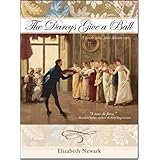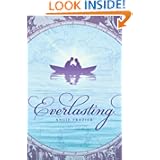What I've Read This Week . . .
The Darcys Give a Ball : A Gentle Joke Jane Austen Style by Elizabeth Newark -- Austenesque Fiction
 Charlotte Collins has been married to Mr. Collins of Pride and Prejudice for 25 years and born him five living children. The family lives at Longbourn and Charlotte does the best she can to cope with the life she chose. Most of her children take after their father, but the youngest boy and youngest girl are promising. Jonathan is a quiet, studious fellow who studies bugs and Eliza is a plain, but cheerful girl with a sense of humor. On his way home from Oxford, Henry Darcy, younger son of Elizabeth and Fitzwilliam Darcy, stops at Longbourn to see his mother's childhood home and meet the cousins he has never seen. Henry, ever the romantic, is instantly smitten with the charming Eliza who likes books, cats, bugs and of course, Henry. The Darcys are shocked by Henry's interest in a Collins and his younger sister Juliet's tendre from an unsuitable gentlemen. Whatever is one to do when one's children insist on forming unsuitable romantic alliances? Why, throw a ball and introduce them to new people, of course! The Darcy's ball serves as a stage for the offspring of Austen's most memorable characters to fall in and out of love and experience all the thrills and danger that young people enjoy so much. Spoiled Juliet Darcy especially needs a lesson in behavior from her cousin Eliza before it's too late and she ruins the Darcy name forever. This is a lighthearted, fluffy, amusing book which reads like fan fiction. I enjoyed it as a piece of fan fiction and recommend others do the same. Do not try to analyze the timeline or be shocked at the characterization of Elizabeth or you will not like this book. Look elsewhere for quality historical fiction and enjoy this "gentle joke."
Charlotte Collins has been married to Mr. Collins of Pride and Prejudice for 25 years and born him five living children. The family lives at Longbourn and Charlotte does the best she can to cope with the life she chose. Most of her children take after their father, but the youngest boy and youngest girl are promising. Jonathan is a quiet, studious fellow who studies bugs and Eliza is a plain, but cheerful girl with a sense of humor. On his way home from Oxford, Henry Darcy, younger son of Elizabeth and Fitzwilliam Darcy, stops at Longbourn to see his mother's childhood home and meet the cousins he has never seen. Henry, ever the romantic, is instantly smitten with the charming Eliza who likes books, cats, bugs and of course, Henry. The Darcys are shocked by Henry's interest in a Collins and his younger sister Juliet's tendre from an unsuitable gentlemen. Whatever is one to do when one's children insist on forming unsuitable romantic alliances? Why, throw a ball and introduce them to new people, of course! The Darcy's ball serves as a stage for the offspring of Austen's most memorable characters to fall in and out of love and experience all the thrills and danger that young people enjoy so much. Spoiled Juliet Darcy especially needs a lesson in behavior from her cousin Eliza before it's too late and she ruins the Darcy name forever. This is a lighthearted, fluffy, amusing book which reads like fan fiction. I enjoyed it as a piece of fan fiction and recommend others do the same. Do not try to analyze the timeline or be shocked at the characterization of Elizabeth or you will not like this book. Look elsewhere for quality historical fiction and enjoy this "gentle joke."
Revolution by Jennifer Donnelly -- Young Adult Fiction
 Andi Alpers lives with her artist mother in contemporary Brooklyn, is a genius, attends a prestigious prep school and is musically talented. Andi is also deeply troubled. Her little brother died two years ago and Andi blames herself. Andi's father walked out and her mother, unable to cope with her grief, has gone crazy. Andi feels the burdens of grief and guilt and drowns her troubles in drugs (legal and otherwise) and music. Music is her saving grace and the only thing she shows an interest in, but even that isn't enough to keep her from giving up. When her father discovers Andi's problems, he sends her mother to a hospital and whisks Andi off to Paris for winter break where he insists she work on her senior thesis. While her father, a geneticist, and their host, a famous historian, set out to solve the mystery of little Prince Louis-Charles, son of Louis XVI and Marie Antoinette who is said to have died a horrible, lonely death locked inside a prison tower. Andi makes a deal with her father that she will finish her thesis outline on the influence of 18th century composer Amadé Malhbeau to current rock musicians by Sunday if her father will let her return home. When all seems hopeless and Andi is about to give up again, she makes friends with some Paris musicians. She is especially drawn to the rapper Virgil whose words, love of music and kindness go a long way to helping Andi. Andi also becomes absorbed in a secret diary she found locked in an antique guitar case which tells the incredible story of a remarkable young woman during the French Revolution who did all she could to survive and then gave up her own safety to try to rescue the little prince. Alexandrine's story parallels Andi's own and she Andi feels connected to the her and to the boy, who was the same age as her brother when he died. The 18th century comes alive for Andi in unexpected ways and she discovers important things about herself and being a survivor. This book is more about Andi and her issues than it is a historical novel. It does cover the French Revolution but not the way I expected. Reading Alex's diary alongside Andi is a poorly executed plot device. It's a little slow and though I was dying to find out what happened to Alex, I thought the story would have worked better if Alex's narrative alternated with Andi's as part of the overall story. The last 1/3 of the book is a little strange but I don't really have problems with the plot. My biggest problem is that the story gets rather political and draws parallels between the past and present. I would have left an intelligent reader to draw their own parallels and take away what they wanted from the book. The writing is mostly good but the lengthy sections of lyrics are off-putting and slow down the narrative. This is definitely a book for older teens/young adults and those who may be able to relate to Andi.
Andi Alpers lives with her artist mother in contemporary Brooklyn, is a genius, attends a prestigious prep school and is musically talented. Andi is also deeply troubled. Her little brother died two years ago and Andi blames herself. Andi's father walked out and her mother, unable to cope with her grief, has gone crazy. Andi feels the burdens of grief and guilt and drowns her troubles in drugs (legal and otherwise) and music. Music is her saving grace and the only thing she shows an interest in, but even that isn't enough to keep her from giving up. When her father discovers Andi's problems, he sends her mother to a hospital and whisks Andi off to Paris for winter break where he insists she work on her senior thesis. While her father, a geneticist, and their host, a famous historian, set out to solve the mystery of little Prince Louis-Charles, son of Louis XVI and Marie Antoinette who is said to have died a horrible, lonely death locked inside a prison tower. Andi makes a deal with her father that she will finish her thesis outline on the influence of 18th century composer Amadé Malhbeau to current rock musicians by Sunday if her father will let her return home. When all seems hopeless and Andi is about to give up again, she makes friends with some Paris musicians. She is especially drawn to the rapper Virgil whose words, love of music and kindness go a long way to helping Andi. Andi also becomes absorbed in a secret diary she found locked in an antique guitar case which tells the incredible story of a remarkable young woman during the French Revolution who did all she could to survive and then gave up her own safety to try to rescue the little prince. Alexandrine's story parallels Andi's own and she Andi feels connected to the her and to the boy, who was the same age as her brother when he died. The 18th century comes alive for Andi in unexpected ways and she discovers important things about herself and being a survivor. This book is more about Andi and her issues than it is a historical novel. It does cover the French Revolution but not the way I expected. Reading Alex's diary alongside Andi is a poorly executed plot device. It's a little slow and though I was dying to find out what happened to Alex, I thought the story would have worked better if Alex's narrative alternated with Andi's as part of the overall story. The last 1/3 of the book is a little strange but I don't really have problems with the plot. My biggest problem is that the story gets rather political and draws parallels between the past and present. I would have left an intelligent reader to draw their own parallels and take away what they wanted from the book. The writing is mostly good but the lengthy sections of lyrics are off-putting and slow down the narrative. This is definitely a book for older teens/young adults and those who may be able to relate to Andi. 




























